module full_adder(input x, input y, input cin, output s, output cout);
endmodule
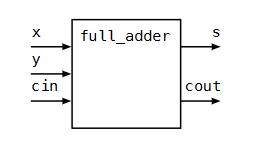
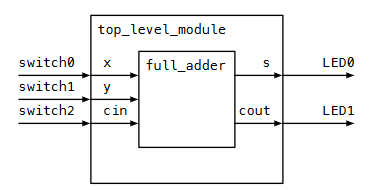
module top_level(input switch0,
input switch1,
input switch2,
output led0,
output led1
);
// instantiate the module full_adder, adder0 is his name
full_adder adder0(
.x(switch0),
.y(switch1),
.cin(switch2),
.s(led0),
.cout(led1)
);
endmodule
wire a;
wire b;
wire [7:0] c; // 8-bit wire declaration
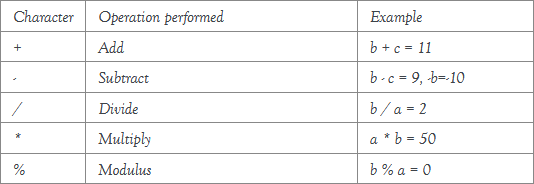
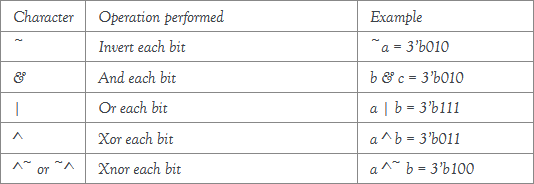
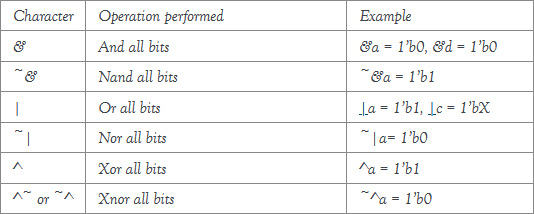
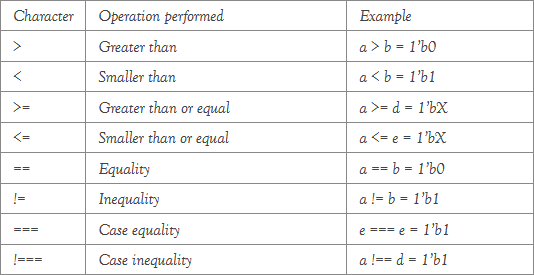



The order of the table tells what operation is made first, the first ones has the highest priority. The () can be used to override default.
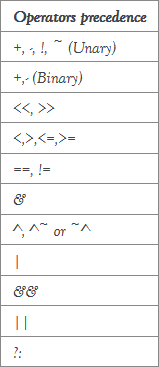
// conditional operator ?:, this example is an expression that implements min(a, 10)
wire out;
assign out = a > 10 ? 10 : a;
// if a==b then c=0
// else if a<b then c=1
// else c=2
assign c = a==b ? 2‘d0 : (a<b ? 2‘d1 : 2‘d2);
`ifndef CONSTANTS // guard prevents header file from being included more than once, it is similar to the header file of C
`define CONSTANTS
`define ADDR_BITS 16
`define NUM_WORDS 32
`define LOG2(x) (x <= 2) ? 1 : \ // calculate the log2(x)
(x <= 4) ? 2 : (x <= 8) ? 3 : (x <= 16) ? 4 : (x <= 32) ? 5 : (x <= 64) ? 6 : -1
`endif
`include "constant.vh"
module memory (input [`ADDR_BITS - 1 : 0] address,
output [`LOG2(`NUM_WORDS) - 1 : 0] data
);
// implementation
endmodule
Verilog has two types of nets: wire and reg. Reg nets are required whenever a net must preserve state(i.e. in an always block). Wires are used for structural verilog(to connect inputs to outputs) and for continuous assignment.
verilog allows more complex logic through the use of always blocks.
Combinational logic(i.e. no state elements) can be written using always@(*). The value inside the parentheses is called the sensitivity list. Using a * will tell the compiler to compute the sensitivity list automatically(recommended for combinational logic)
Only reg nets can be assigned in an always block
input wire a;
input wire c;
output wire b;
reg b_out;
//
always @(*)
begin
b_out = ~a;
end
assign b = b_out;
// if-else statements
always @(*)
begin
if(a)
b_out = c;
else
b_out = ~c;
end
// case statement
always @(*)
begin
case(a)
0: b_out = c;
1: b_out = ~c;
default: b_out = c;
endcase
end
WARNING:
// This code will generate a latch
input [1:0] x;
reg [1:0] y;
always @(*) begin
if(x == 2‘b10)
y = 2‘d3;
else if(x == 2‘b11)
y = 2‘d2;
end
// y has a default value so that this code will not generate a latch
always @(*) begin
y = 2‘b00;
if(x == 2‘b10)
y = 2‘d3;
else if(x == 2‘b11)
y = 2‘d2;
end
Synchronous logic blocks are generated using special identifiers in the sensitivity list. Here we only want to update on the positive edge of the clock, so we use posedge. This will generate a synchronous circuit that implements x every clock cycle.
input clk;
reg [1:0] x;
always @(posedge clk)
begin
x <= x + 1;
end
Rules for picking a wire or reg net type:
1.localparam: Private module parameters are defined using the localparam directive. These are useful for constants that are needed only by a single local module, and it can not be instantiated with it
2.parameter: it‘s feature is similar to localparam, further more, it can transimit the parameter setting
For example, first define a module
module example #(parameter SIZE=7)
(input clk,
input rst_n,
output [SIZE-1 : 0] data
);
localparam K = 5;
reg [7:0] x;
always @(posedge clk or negedge rst_n)
begin
if(!rst_n)
data <= 0;
else
data <= K + x;
end
endmodule
second when to instantiate the example module in the top level, and data size is required to modified as 32-bit
example EX1
#(.SIZE(32)) // 参数例化
(
.clk(clk),
.rst_n(rst_n),
.data(data)
);
-- wait to fill up
// A memory structure that has eight 32_bit elements
reg [31:0] fifo_ram [7:0];
fifo_ram[2] // represents the full 3rd 32-bit element
fifo_ram[5][7:0] // represents the lowest byte of 6th 32-bit element
`timescale 1ns/1ps
// a delay of #1 would result in a 1ns step
// Delays as low as #0.001 would be supported due to the resolution of 1ps
module tb;
reg clk_in;
reg rst_n;
wire clk_out;
reg a_in;
wire b_out;
initial
begin
clk_in = 0;
repeat (20) #10 clk_in = ~clk_in;
end
initial
begin
rst_n = 0;
#10;
rst_n = 1;
end
initial
begin
a_in = 0;
#10 a_in = 1;
#10 a_in = 0;
end
divider D1(
.clk_in(clk_in),
.clk_out(clk_out),
.rst_n(rst_n),
.a(a_in),
.b(b_out)
);
endmodule
原文:https://www.cnblogs.com/georgemxx/p/14002835.html